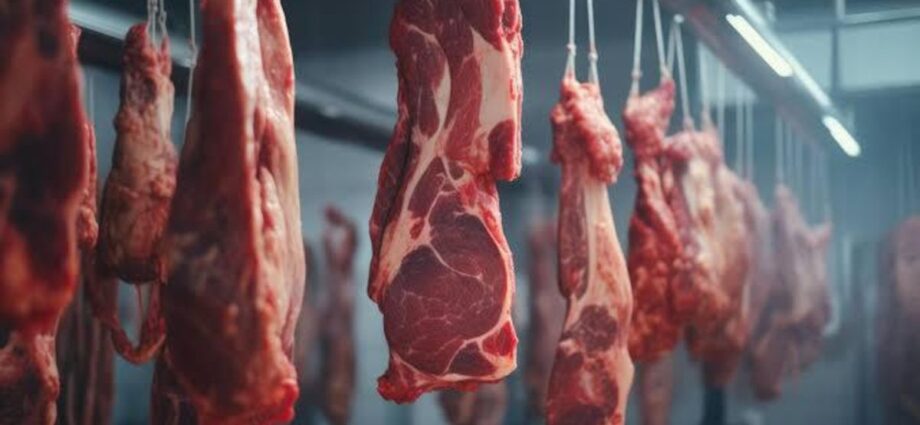Dar es Salaam. Tanzania has exported over 95 percent of its meat to Middle Eastern countries in 2023/24, making the region an important market for the country’s economic growth and transformation, data from the Tanzania Meat Board (TMB) shows.
Tanzania exported 13,745.4 metric tonnes of meat in the 2023/24 fiscal year, 955.62 metric tonnes less than 14,701 metric tonnes exported in the preceding financial year.
Meat exported in 2023/24 attracted $56.59 million (Sh153.36 billion), less than $61.40 million (Sh166.38 billion) earned in the 2022/23 financial year.
TMB data shows that in the 2023/24 financial year, Qatar leads a list of Middle Eastern countries that have imported meat from Tanzania by 30.8 percent.
It is followed by Oman, which imported 27.63 percent, the United Arab Emirates (UAE) by 20.64 percent, and Saudi Arabia, which imported 7.54 percent of the produce.
Other Middle Eastern countries and the percentage of imported meat in brackets are Kuwait (4.66 percent), Bahrain (2.74 percent), and Iraq (0.27 percent).
Trailing on the list are a few Far East countries, including Hong Kong (2.01 percent), China (1.74 percent), and Vietnam (0.8 percent).
Speaking to The Citizen during an exclusive interview, the TMB acting marketing manager, Mr Nicholai Chiweka, attributed the Tanzania Middle East market dominance to the increase in processing factories and the quality of products.
“Through the TMB, the government has increased investment in the meat value addition to ensure market expectations are realized.
A public awareness campaign is also underway to change herders’ mindset and shift to modern livestock keeping to financially benefit from what they are doing,” he said.
He said herders are also educated to abandon traditional livestock keeping for the sake of pride and adequately increase their focus on profit maximisation.
“These measures not only will enable the country to maintain existing markets but also secure new ones in the same region and beyond. The move will make the livestock subsector significantly contribute to the country’s economic growth,” he said.
Export trend
Mr Chiweka said meat exports have been on the increase since the 2019/20 fiscal year, when 692.46 metric tonnes were exported, generating $1.298 million (Sh3.52 billion).
The amount increased to 1,774 metric tonnes in the 2020/21 financial year, bringing in $4.29 million (Sh31.51 billion).
TMB data shows that the volume of exports in other financial years and revenue generated in brackets are: 10,415 metric tonnes (2021/22) generating $42.5 million (Sh115.18 billion); and 14,701.1 metric tonnes in the 2022/23 fiscal year bringing in $61.39 million, equalling Sh166.37 billion.
However, exports in 2023/2024 slipped to 13,745.1 metric tonnes worth $56.589 million, equivalent to Sh153.36 billion.
Domestic meat consumption
However, Mr Chiweka said despite increasing meat production, only a fraction of it was exported, revealing a huge challenge facing the country in securing new markets globally.
“This should go in line with public mobilisation to increase meat consumption from the current 16 kilogrammes per capita, which is extremely less compared to 50 kilogrammes per capita recommended by the UN’s Food and Agriculture Organisation (FAO),” he said.
Goat, donkey meat
According to TMB data, lamb and goat meat have been significantly contributing to high meat export volumes, highlighting, however, that despite the contribution, the country no longer exports donkey meat for the last two fiscal years.
“An average of 8,619.2 tonnes of goat meat and 3,106.96 tonnes of lamb meat were exported between 2021/22 and 2023/24 financial years.
Only 300 tonnes of donkey meat were exported in the 2021/22 fiscal year,” he said, adding no single tonne was exported in the 2022/23 and 2023/24 fiscal years.
According to Mr Chiweka, the subsectors’ strategic plan 2020/21-2025/26 targets the 16,000-tonne meat export, hinting that the board was confident with the realisation of the target.
“We are confident that undertaken measures will support the realisation of this target.
Efforts to register new markets in other regions are encouraging according to recent development,” he said.
What experts say?
Repoa executive director, Dr Donald Mmari, suggested that improving productivity through the introduction of productive breeds will assure the country’s meat market sustainability.
“The country should also understand the market demand, including required quality, and increasing efforts to extend the product’s export to other regions are crucial for the country to reap big from the subsector,” he said.
His Open University of Tanzania (OUT) counterpart, Dr Lawi Yohana, said Tanzania should aim at dominating the Middle East market through increasing volume of export.
“The Middle East is an ideal market for Tanzania due to its geographical location as compared to the European market, which is saturated and self-sufficient in livestock products.
We need to maintain the Middle East market by sending quality products,” he insisted.
According to him, looking for new markets was the right idea to safeguard the country’s meat exports, especially during political volatility and subsequent crises.















